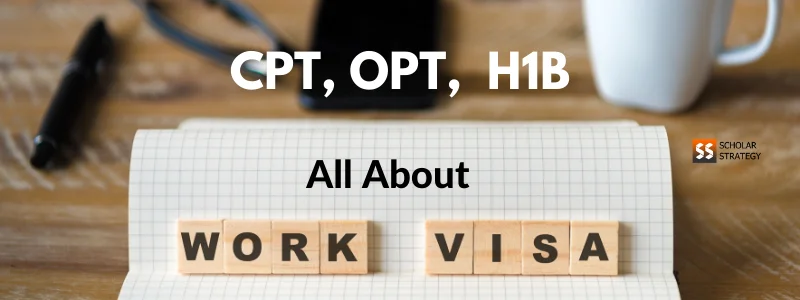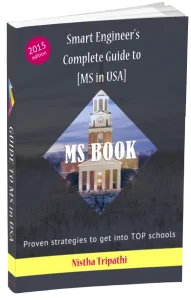Confused about CPT and OPT? How can you work on the student visa in USA? How can you work after graduating?
How does CPT and OPT work?
While many Indian students plan to go to US for advanced degrees, very few are aware of how the visa process works there and why it is important to know about students and work visa before you join any academic program.
F1 visa and Form I20
For students, there are two important visa categories that determine your career prospects. First is student visa (referred to as F1) without which you cannot study in US. When any university accepts you, it will send you a Form I20 which is required to apply for a student visa. Things to note:
- Having an I20 alone does not mean that you will get the student visa. You need to apply for it and pass through the interview process.
- An I20 from a good reputed university increases the chances of your getting the student visa. This is another reason why students should apply to good universities.
- You can study, do an internship and work for a limited time after graduation on student visa.
Good news is that you can work while studying in USA. Here is University of Washington describing employment options for students.
CPT and OPT
Curricular Practical Training (CPT) is a program that temporarily allows international students with an F1 visa to gain practical experience directly related to their major through employment, paid or unpaid internships, or cooperative (co-op) education. It must be part of an established curriculum. CPT must be completed before graduating. In addition, CPT can be part-time (20 hours or less a week) or full time (20 hours or more a week).
Optional Practical Training (OPT) is a program that temporarily allows international students with an F1 visa in the United States to work in relation to their major of study. F1 visa students are eligible for OPT after completing their first academic year. For a normal student, you are allowed 12 months of OPT.
International students with an F1 visa who have completed degrees in certain science, technology, engineering and mathematics (STEM) are eligible for a 24-month extension for post-graduation completion of OPT employment.
H1B visa for fulltime work
But to work for longer term, you cannot keep using the CPT and OPT. You need the highly competitive work visa – referred to as H1B visa.
H1B visas are issued by employers and you cannot personally apply for them. This means you need to have a job offer from a company who is willing to sponsor your H1B visa (it has non trivial fee plus is subjected to regulations by US govt.).
Few complications are involved such as H1B visas are issued only for some job categories where govt feels enough local American work force is not sufficiently skilled or available. For eg. while H1B visas are easily issued for software programmers, they are not for marketing or HR roles – this is one reason why more foreign students go for Computer Engineering than lets say MS in Marketing. So, while a lot of Marketing jobs may be available in US, it is not necessary that companies will hire international students (who require H1B visas) for these positions.
I witnessed this first hand while doing MBA at NYU. Some of my classmates could not intern at bigger companies like Amex in Marketing roles because they were not sponsoring H1B visas for Marketing department. Usually, if a company cannot sponsor H1B visa in future, they also don’t offer internships to those candidates even though internships do not require H1B. In short, you need to understand that:
- To work long term in USA, you NEED H1B visa sponsored by a company.
- H1B visas are issued for specific roles and some fields are friendlier to getting these eg. IT, software engineering, finance etc.
- Indian students should consider whether they can get work visas after graduating in their desired field or not. If H1B visas are not easily issued in your field of study, one may have to come back to India for employment after graduation.
- Even when you get H1B visa, you can only work that employer. This means, you cannot work part time at any other place in parallel and you cannot start your own company while working on H1B visa.
- H1B visas are issued for 3 years after which they can be reissued for another 3 years – thus 6 years in total. By the end of your 6 years, if your employer has filed your green card application and it has reached a specific stage, you can keep extending your H1B visa on a yearly basis. However, if your green card has not been filed or did not reach that stage at the end of 6 years, you need to live outside USA for at least 1 year before you can get H1B for 3 years again.
- H1B visas are extremely competitive and subject to strict quotas. If the govt. receives more H1B applications than the quota, then they are picked by lottery and your getting the visa depends on your luck.
One more interesting thing about these visas – F1 visas are granted on your intention of coming back to your home country after studying and thus proving that you have no intention of working in USA. Thus, in your F1 visa interviews, you should be prepared to show that you want to come back to India after studying. On contrary, to keep working in USA, you need H1B visa.
A sensitive time comes when you start working on OPT (the limited time for which you can work directly on student visa until you get the H1B) and your company has applied for H1B visa. In this period if you are traveling to India and re-enter USA on F1 visa (till the H1B is issued), you may be declined an entry due to conflict of interests since your H1B application means that you want to work in US whereas F1 visa status expects you to go back to your home country upon completion of your program. This is why some people prefer not to travel after graduation until you have received your H1B visa.
So, you should be aware of some visa intricacies so that you can plan your studies, travel and career accordingly.
Lately, there have been a lot of attacks on H1B by Trump administration. You can read about latest updates on H1B right here on this blog.



No comment yet, add your voice below!